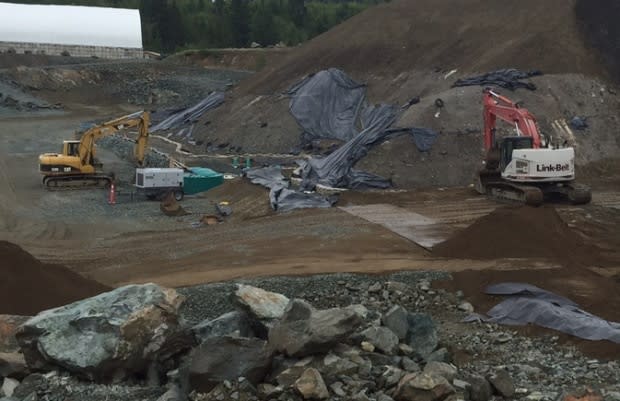'Trapped in a dump': Shawnigan Lake resident frustrated over high property value
A resident in Shawnigan Lake, B.C., says he is shocked that his assessed property value remains high despite the provincial government's decision not to remove around 100,000 tonnes of contaminated soil from a controversial landfill next to his property.
"It hasn't decreased enough because we have a toxic waste dump in our backyard. We're all paying too much tax," says resident Kevin Glass.
Glass said he and his neighbours are appealing their assessments, hoping to have them lowered, so they can sell more easily, and so newcomers will be able to afford to build new homes and move in to what "was supposed to be a high-end neighbourhood."
Landfill timeline
The landfill, located in an old quarry in the hills above the community of Shawnigan Lake, received a permit in 2013 to accept and store up to 100,000 tonnes of contaminated soil each year. Contaminated soil is typically caused by industrial activity but does not include hazardous waste.
In 2017, the province pulled the permit after it said the company, Cobble Hill Holdings, failed to provide documents proving financial security.
The decision to revoke the permit followed years of protests and several court battles over the facility.
In July 2019, the province decided on a landfill closure plan that does not involve removing the soil, but involves regular monitoring by the province.
Glass said his property value only decreased by four per cent last year, after it was announced the soil would stay. It had jumped 20 per cent the year before, after the site's permit was pulled.
After years of controversy surrounding the site and widespread concerns over possible contaminants in the drinking water, Glass is left questioning what the "real market value" might be "when we're trapped in such a dump."
He added that there are a number of half-constructed houses in the neighbourhood because it's too expensive to complete them.

Assessments 'based on market transactions'
Gerry Marolla, deputy assessor for B.C. Assessment's Vancouver Island branch, said residents from the neighbourhood have been appealing their property values since 2015, when the issue took off. Currently, five property owners have appealed their 2019 assessment.
"At the end of the day, we have to look at what the market transactions are selling for in the area," Marolla said about how property values are assessed.
District continues to pressure government
Aaron Stone, chairman of the Cowichan Valley Regional District, says he "absolutely sympathizes" with the residents, and continues to pressure the Ministry of Environment to remove the contaminated soil from the site.
"Protecting drinking water is paramount," said Stone, adding the district did propose a soils deposit bylaw in 2017, but "reclamation of mining sites or contaminated sites … are not within the jurisdiction of the regional district." The bylaw was amended in 2019 to require fees for soil deposits.
Bernhard Juurlink from the Shawnigan Basin Society said the Vancouver Island Health Authority conducted a test of the well water right next to the site, where it found lead levels to be five times higher than the allowable limit.
A statement from the Ministry of Environment and Climate Change Strategy says "though the Cobble Hill Holdings landfill site is no longer operating, the company is responsible for maintaining and dealing with the site under the Spill Prevention Order."
It says any new soil added to the site "advances work of the closure plan" and will "stabilize the landfill" and "reduce any chance of erosion."

